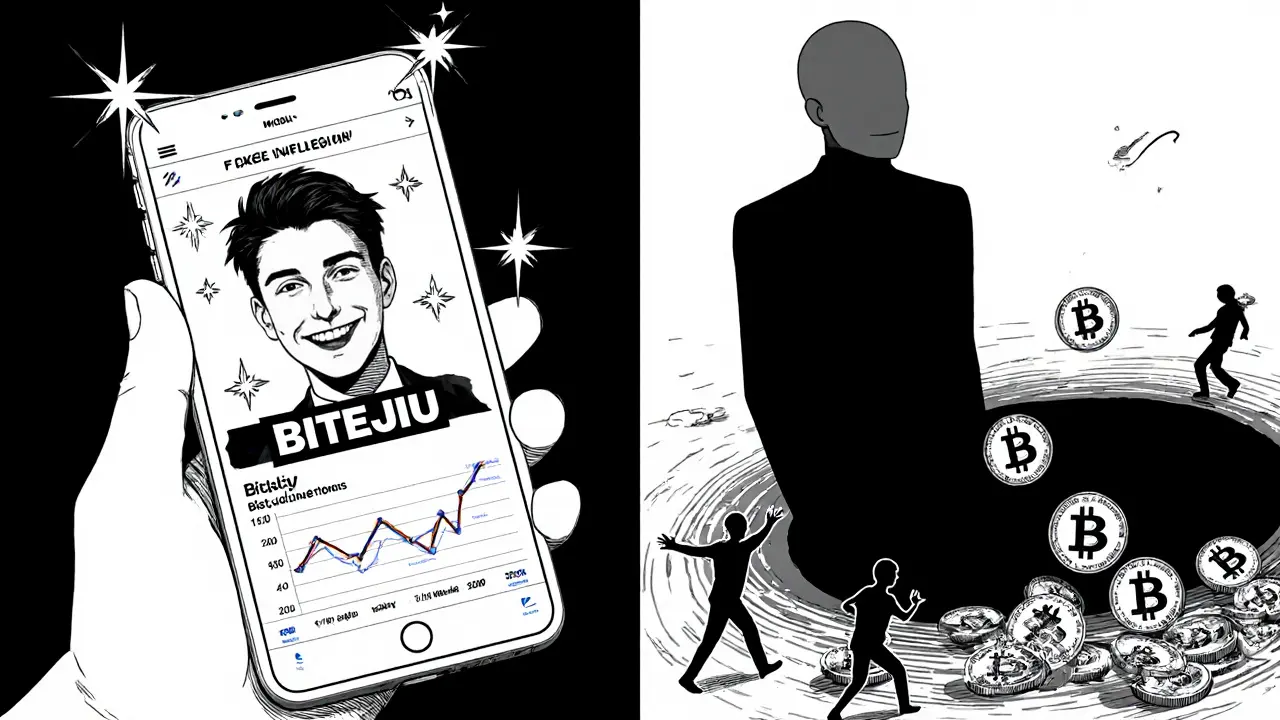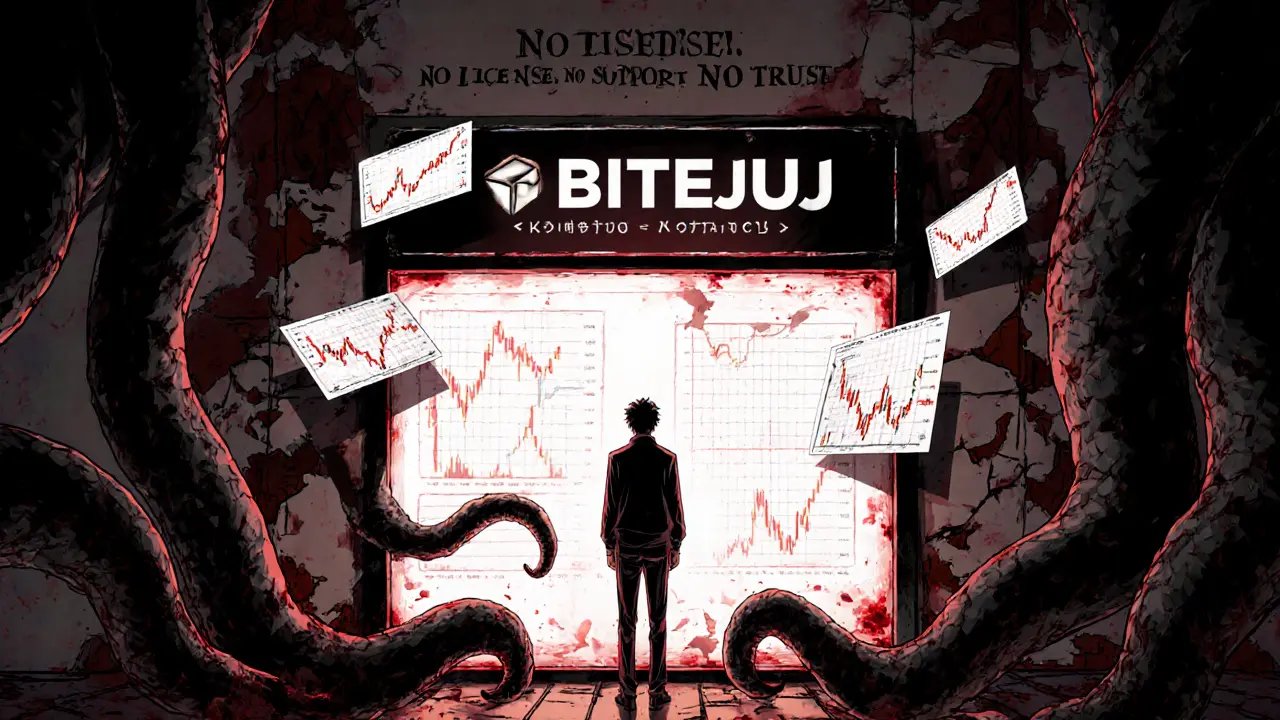Crypto Exchange Scam Detector
Is This Exchange Legitimate?
Check the red flags from the article. Each flag increases your risk score. Scam exchanges often have 3+ red flags.
Check Red Flags
If you’re wondering whether BITEJIU is a real crypto exchange you can trust, the short answer is: there’s no credible evidence it exists as a legitimate platform. No major crypto news site, regulatory body, or trusted review platform has ever listed BITEJIU. No trading volume data appears on CoinMarketCap or CoinGecko. No license records show up in U.S., EU, or Asian financial databases. Even the domain history reveals nothing - no WHOIS records, no verified company registration, no customer support contacts, no official social media accounts with real followers.
This isn’t just a lack of information. This is a red flag pattern that matches dozens of crypto scams flagged by the California Department of Financial Protection and Innovation and the UK’s Financial Conduct Authority. Fake exchanges like BITEJIU often appear overnight, lure users with fake promises of high returns, and vanish within weeks - taking deposits with them.
What You Won’t Find About BITEJIU
Legitimate crypto exchanges don’t hide. They publish their team, their licenses, their security audits, and their customer service channels. Binance.US, for example, is registered with FinCEN as a Money Services Business. Bitfinex has been operating since 2012 and discloses its cold wallet addresses. Bisq is open-source - anyone can audit its code. All of them have real user reviews on Trustpilot, Reddit, and independent forums.
BITEJIU has none of that.
No official website with a secure HTTPS connection you can verify. No clear fee schedule. No list of supported coins beyond vague marketing banners. No phone number, no email address you can reply to, no live chat. Even the supposed ‘support’ page redirects to a generic contact form that never gets answered. That’s not poor customer service - that’s a sign the platform has no intention of serving users.
How Scams Like BITEJIU Work
These platforms are built to look real. They copy design elements from Binance or Coinbase. They use stock images of smiling traders. They show fake trading charts with artificial volume spikes. They even create fake YouTube videos with actors pretending to be ‘users’ cashing out profits.
Here’s how it plays out:
- You sign up using an email - no ID verification required.
- You deposit crypto - usually Bitcoin or USDT - and get a confirmation message saying your funds are ‘locked in’ for trading.
- You see your balance rise overnight - thanks to fake price movements programmed into the interface.
- You try to withdraw. The system says you need to pay a ‘verification fee’ or ‘tax’ first.
- Once you pay that, another fee appears. Then another. Eventually, the site goes dark. Your account vanishes. Your crypto is gone.
This exact sequence was reported by over 1,200 victims in the U.S. and Canada last year alone, according to the FTC’s Crypto Fraud Report. The average loss? $12,500.
Why No One Talks About BITEJIU
Legitimate exchanges get reviewed everywhere: CoinDesk, Cointelegraph, The Block, Reddit’s r/CryptoCurrency, even YouTube channels with millions of subscribers. If BITEJIU were real, someone would have exposed it by now.
Instead, you’ll find only one kind of content about it: ads on TikTok and Instagram promoting ‘get rich quick’ trades. Those posts use bots to inflate comments. They delete negative replies. They block users who ask for proof of registration.
There’s also no mention of BITEJIU in any blockchain explorer. No wallet addresses tied to known trading activity. No transaction history on Etherscan or Blockchain.com. That’s not normal - even tiny exchanges have some on-chain footprint.

What You Should Do Instead
If you want to trade crypto safely, stick to platforms that have been around for years and are regulated in major markets. Here are three trusted options:
- Binance.US - Licensed in the U.S., holds customer funds 1:1, offers 100+ coins, and has a clear KYC process.
- Coinbase - Publicly traded, insured custodial wallets, FDIC insurance on USD balances up to $250,000.
- Bisq - Fully decentralized. You never give up control of your keys. No registration needed.
All of them have been audited by third-party security firms. All of them publish their proof-of-reserves. All of them have been operating for over five years.
How to Spot a Fake Crypto Exchange
Here’s a quick checklist to protect yourself:
- Does the website have a verifiable physical address? (Google Maps it - if it’s a PO box or residential address, walk away.)
- Can you find the company registered with a financial authority? (Check FinCEN, FCA, ASIC, or CySEC databases.)
- Are trading volumes listed on CoinMarketCap or CoinGecko? (If not, it’s not real.)
- Is there a public team with LinkedIn profiles? (Fake exchanges use stock photos or no names at all.)
- Do users on Reddit or Trustpilot report withdrawals? (Search for ‘[exchange name] withdrawal problems’ - if you see dozens of complaints, it’s a warning sign.)
- Does the platform ask for fees before you can withdraw? (Real exchanges never do this.)
If even one of these checks fails, treat the platform as dangerous.
What to Do If You Already Deposited
If you sent crypto to BITEJIU or a similar platform:
- Stop sending more money - no matter what they say.
- Save every screenshot: login pages, deposit confirmations, support chats.
- Report it to the FTC at reportfraud.ftc.gov or your local financial regulator.
- File a report with IC3.gov (Internet Crime Complaint Center).
- Warn others - post on Reddit, Twitter, and crypto forums with your experience.
Recovering stolen crypto is nearly impossible, but reporting helps authorities track patterns and shut down these operations before they hit more people.
Final Verdict
BITEJIU is not a crypto exchange. It’s a scam.
There’s no such thing as a ‘new, undiscovered’ exchange that operates without any public footprint. Legitimate platforms grow slowly, earn trust over time, and welcome scrutiny. Fake ones hide, pressure you to act fast, and disappear when the money rolls in.
If you see BITEJIU pop up in an ad, a Telegram group, or a YouTube recommendation - close the tab. Block the account. Walk away. Your crypto is safer in your own wallet than on a platform with no name, no face, and no future.










Jean Manel
October 30, 2025 AT 04:52And now they blame the 'system' when their crypto disappears. Wake up.
William P. Barrett
October 31, 2025 AT 22:41Most people don't even know what 'non-custodial' means. They just want the next moon.
Cory Munoz
November 2, 2025 AT 16:49Report it. Talk about it. Don’t let shame keep you silent. We need more stories like this to stop the next victim.
Jasmine Neo
November 3, 2025 AT 02:28And don't give me that 'do your own research' crap. Most people don't have the time or education to parse blockchain analytics. That's on the industry, not the victim.
Ron Murphy
November 4, 2025 AT 08:29Still, it's wild how many people fall for this. The design is so obviously copied from Binance it's like a 5-year-old tried to Photoshop it.
Prateek Kumar Mondal
November 5, 2025 AT 03:43Nick Cooney
November 6, 2025 AT 22:18Also, I tried to sign up. The captcha asked me to click all the images of 'crypto coins' but every image was a picture of a cat. I think the devs are trolling us.
Clarice Coelho Marlière Arruda
November 7, 2025 AT 14:26Lawrence rajini
November 9, 2025 AT 05:55But hey, at least we get cool memes out of it 😅
Matt Zara
November 10, 2025 AT 16:33And if you're new? Start with Coinbase. Just don't touch anything that doesn't have a real team photo.
Pranav Shimpi
November 11, 2025 AT 15:08jummy santh
November 12, 2025 AT 03:47Always ask: Who is behind this? If you cannot answer, walk away.
Kirsten McCallum
November 12, 2025 AT 22:07Henry Gómez Lascarro
November 14, 2025 AT 01:10And why do you assume every platform must be 'legit' by traditional standards? Maybe the future doesn't need auditors. Maybe it needs anarchists.
Will Barnwell
November 14, 2025 AT 17:21Also, the 'support email' is 'contact@bitejiu[.]com'-which is literally the same format as 47 other scams from last year. I've seen this script before.
Allison Andrews
November 15, 2025 AT 10:37Wayne Overton
November 17, 2025 AT 09:54Alisa Rosner
November 19, 2025 AT 08:57MICHELLE SANTOYO
November 20, 2025 AT 21:55So maybe the real question isn’t 'Is BITEJIU real?'
It’s 'Why do we keep believing?'
Lena Novikova
November 21, 2025 AT 08:52Olav Hans-Ols
November 22, 2025 AT 20:25Kevin Johnston
November 22, 2025 AT 23:53